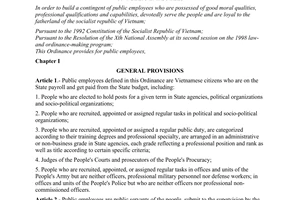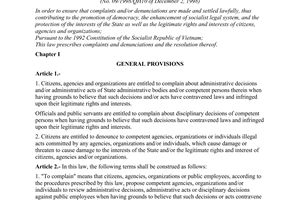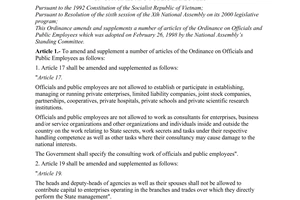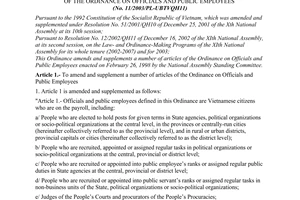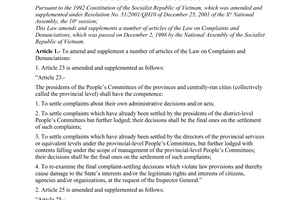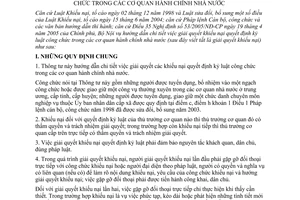Nội dung toàn văn Circular No. 01/2006/TT-BNV of January 13th 2006, detail guidance on settling the complaints to against the disciplineddecision of civil servants in state-run administrative agencies
|
MINISTRY
OF HOME AFFAIRS |
SOCIALIST
REPUBLIC OF VIETNAM Independence
- Freedom – Happiness |
|
No: 01/2006/TT- BNV |
Hanoi, January 13th 2006 |
CIRCULAR
DETAIL GUIDANCE ON SETTLING THE COMPLAINTS TO AGAINST THE DISCIPLINEDDECISION OF CIVIL SERVANTS IN STATE-RUN ADMINISTRATIVE AGENCIES
Pursuant to the Law on
Complaint and Denunciation dated December 2nd 1998 and the Law on Revised and
Supplementary several Articles of Law on Complaint and Denunciation dated June
15th 2004.
Pursuant to the Ordinance on Civil Servants and Officials and the
implementing guidance documents.
Pursuant to the Article 35 of the Decree No 53/2005/N§-CP dated April 19th
2005 of the Government.
The Ministry of Interior guides particularly to settle the complaint to
against the disciplined decision of civil servants in the state-run
administrative agencies (after-here shorted the complaint settlement) as
bellows:
I- THE GENERAL PROVISIONS:
1. The Circular guides particularly to settle the complaint against the disciplined decision of civil servants in the state-run administrative agencies
The objects of the Circular include: the people who are employed and appointed in one of scales of civil servant, or assigned a permanent duty in state-run agencies in central, province, and district levels; or civil servant who are recruited and entrusted a specialized function in the commune people's committee, which are regulated at Point c and h of Item 1, Article 1 of the Ordinance on State Cadre and Civil Servant issued 1998, revised and supplemented in 2003.
2. Which company issues the disciplined decision, this very company has jurisdiction and responsibility to settle the complaint of it; in the case of the civil servants continue to appeal, the direct higher echelon agency have to solve it.
3. The settlement have to ensure the objective, democratic principles, and under the laws.
4. In the settlement process, the authorized agencies, who settle the complaint, have to hold the first meeting with the complainant, or his representative, or person with related rights and obligations (if necessary), to make a dialogue directly to clear the complaint content, requirements of the complainant, and giving the solving aspects. The meeting has to be held publicly and democratically.
For the second settlement, the meeting for direct conversation is only held when it is necessary. In the complicated, long lasting case or it appears more new details, which make a major change in content of the case, the second meeting will have to be held by the authorized agency to make clearly all details.
The complainants have the right to give his power to his legal representative to take part in the meeting and conversation.
5. The civil servants made the complaint must have enough acting ability in accordance with the law 's regulations.
If the complainants suffer a mental disease, or other illnesses, which are considered as unconscious or uncontrollable mind by the jurisdictional health agencies, they will have to make their complaint through legal representative. And if the civil servants are being ill or suffering a physical loss, and not enough health to implement their right to make a complaint, they are also entitled to authorize to their legal representatives.
6. Prescription:
a. The prescription for the first complaint is 15 days, from date the civil servants receive their disciplined decision.
b. The prescription for the second complaint is 10 days, from date the civil servants receive the first settlement decision.
The prescription for the second complaint of disciplined decision which force them to quit their jobs, or for starting a lawsuit in administrative court, is 30 days, from date the civil servant receives the first settlement decision.
c. In the case of civil servants meet some obstacles in their health, on their business, their study, or meet disasters, or other objective barriers, and they are unable to make their complaint in regulated prescription, so the time for obstacle will not be counted in the legal prescription for complaint.
7. The following complaints will not be settled:
a. The disciplined decisions do not relate to the legal right and benefit of the civil servants made the complaint.
b. The civil servants do not have enough acting ability, but not be replaced by legal representatives.
c. The representatives are illegal.
d. The prescriptions of the first or the second complaint come to the deadline without legal reasons.
The complaint has been solved by the second settlement decision and the case has not more new details, which is able to influence in the major content of the case.
e. The complaints against the disciplined decisions, which force civil servants to quit their job, have been judged by the Court under the law, or have gotten the legal judgment of the Court.
g. The complaints are sent to the agencies, which have not enough jurisdictions to settle them.
For the above-unsettled complaints, within 10 days from receiving the complaint, the agencies, which receive the complaint letter, have to send the reply by written to the complainants, in which indicate clearly the reason why the complaints are not solved. And the replies are made only one time.
II- THE RIGHTS AND OBLIGATIONS OF THE CIVIL SERVANTS MAKING COMPLAINTS AND OF AUTHORIZED AGENCIES SETTLING THE COMPLAINTS
ITEM I: THE RIGHTS AND OBLIGATIONS OF THE CIVIL SERVANTS MAKING COMPLAINTS
1. The rights of the civil servant who is making complaints:
a). To have the right to make the complaint to the jurisdictional agencies themselves, or through their legal representative, when they have evidences to show that the disciplined decision is illegal, and it violates their legal rights and benefits.
b) To have the right to take part in the meeting, and make a dialogue directly with the jurisdictional agencies themselves, or give their power to the representative or the person with related rights and obligations (if necessary) to do it; To have the right to know all evidences which are presented and used by jurisdictional agencies in settlement process; As well as to have the right to show their proofs, and explain the opinions about the proofs they given out;
c) To be entitled to get the reply on the settlement by written from authorized agencies; As well as to be provided all information and documents related to the settlement; and to be received the settlement decisions.
d) To be ensured to restore the legal rights and benefits, which have been violated by illegal disciplined decision (if necessary); And to be compensated their damages according to the law.
To have the right to continue to make the complaint again if they do not agree with the first settlement decision; Civil servants, who get the disciplined decision on forcing them to quit their jobs, as well as got the first settlement decision with constant disciplined form, have also the right to make the complaint again, or to take the administrative lawsuit in the Court, according to the Law on State Cadre and Civil servants and the Law on Administrative Claims.
e) To have the right to withdraw the complaint whenever they want in the settlement process.
2.The obligations of the civil servants making complaints:
a).To have the obligation to send their complaints exactly to the jurisdictional agencies to solve the problem and in the prescription regulated by the law.
b).To have the obligation to be present in the meeting and make a dialogue directly, under the requirements of jurisdictional agencies, or authorize to legal representative to do it; To show the case honestly, to supply information and documents to the jurisdictional agencies; To take responsibility with the law for the contents, information and documents they presented.
c).To strictly comply with the settlement decision, which have come into force.
ITEM II: THE RIGHTS AND OBLIGATIONS OF THE AUTHORIZED AGENCIES SETTLING COMPLAINTS
1. The rights of the authorized agency who is settling complaints:
a). To solve the complaint letters which belong to their jurisdiction.
b). To ask complainant, or person with the related right and obligation, to be present in the meeting and in direct dialogue on complaint contents.
c). To verify and make a valuation for contents and evidences of case in accordance with the law.
d). To be entitled to get the second settlement decision from higher authorized agency, which solves the case in the second times.
e). The higher authorized agency, who solve the complaint in the second times, have the right to ask the first authorized agency to supply all records of the case; as well as have the right to ask the complainant to provide their information, documents, and legal evidences.
2. The obligations of the authorized agencies settling complaint:
a) To receive and solve the complaint letters belonging to their jurisdiction.
b).To settle the complaint letters according to the order, procedure, and in the term regulated by the law.
c). To send the settlement decision to the complainant or his legal representative and to the second authorized agency.
d). To explain the disciplined decision which to be appealed; To provide all records of case, evidences, information, and documents when they are required by related offices, organizations, and individuals.
e). To strictly comply with the second settlement decision, which become into effect, from the higher authorized agency.
f). To compensate the damages, and to overcome the aftereffects caused by the illegal decision according to the law.
III- THE JURISDICTION TO SETTLE THE COMPLAINT
1. The leaders of agencies depending directly on the department, the board, and the branch in provincial people's committee, and the leader of agencies depending directly on district people's committee, have jurisdiction to settle the complaint against the disciplined decision made by themselves in order of decentralization.
2. The chairman of district people's committee has jurisdiction to do:
a). To solve the complaint against the disciplined decision made by himself.
b). To solve again the complaint, which is first settled by the leader of agency depending directly on district people's committee, and still appealed again.
3. The director of department and equivalent leaders have jurisdiction to do:
a). To solve the complaint against the disciplined decision made by himself.
b). To solve the second complaint, which is first settled by the leaders of units depending directly on the department, the board, and the branch in provincial people's committee, and still complained again.
4. The chairman of the provincial people's committee has jurisdiction to do:
a). To solve the complaint against the disciplined decision made by himself.
b). To re-solve the complaint, which is first settled by chairman of district people's committee, director of department and equivalent leaders, and still complained again.
5. The leaders of agencies depending directly on ministries and equivalent agencies, or on Government, have jurisdiction to settle the complaint against to the disciplined decision made by themselves in order of decentralization.
6. The ministers and equivalencies, and leaders of agencies depending directly on Government have jurisdiction to do:
a) To solve the complaint against the disciplined decision made by themselves.
B) To re-solve the complaint, which is first settled by leaders of agencies depending on ministries and equivalence, or on Government, and still complained again.
7. The minister of Ministry of Interior has jurisdiction to do:
a). To solve the complaint against to the disciplined decision made by himself.
b). To solve again the complaint, which is first solved by leaders of agencies depending on Ministry of Interior, and still appealed again.
c). To solve the second complaint, which has settled by ministers and equivalencies, and leaders of agencies depending directly on Government, chairman of the provincial people's committee, and still complained again.
d). To give good counsel and consultation in settling other complaints under the guidance and lead of the Prime Minister.
IV- THE ORDER AND PROCEDURE IN SETTLING COMPLAINTS
ITEM 1: THE ORDER AND PROCEDURE IN SETTLING COMPLAINTS
1. Within 15 days from the date of receiving the discipline decision, if the civil servant do not agree and make a complaint of it, he (or his legal representative) will must send his complaint letter, enclosed a copy of discipline decision, and related documents to authorized agency.
The content of complaint letter must shown clearly:
a). The date, month, and year of making the complaint.
b). Full name, address of the complaint or his representative.
c) The content and reason of the complaint, and his requirements.
The complaint letter must be with signature of the civil servant or his representative.
d). The decision on first settlement
®. All related documents
The complaint record must be paged in order of documents, and retained according to regulations of the law. In the case civil servant do not agree and make the second complaint of it, or take a lawsuit in administrative court, all his complaint record must be sent to higher authorizes agency or the court, who have jurisdiction to re-settle.
ITEM 2: THE ORDER AND PROCEDURE IN THE SECOND SETTLING COMPLAINTS
1. Within 10 days from the date of receiving the first settlement decision, if the civil servant do not agree and make the second complaint of it, he (or his legal representative) will must send his second complaint letter, enclosed a copy of first settlement decision, and related documents to authorized agency, who has jurisdiction to settle again.
The content of the second complaint letter includes:
a). The date, month, and year of making the complaint.
b). Full name, address of the complaint or his representative.
c). The content, reason of the complaint, and civil servant's requirements.
The complaint letter must be with original signature of the civil servant or his representative (not be used the photocopy letter).
2. Within 10 days from the date getting the complaint record, which is under the jurisdiction, the second authorizes agency must solve the case and reply in written to the complainant or his representative, and the first authorized agency.
The equivalent inspection office and personnel management has responsibility to assist the second authorizes agency to solve the case and make all related procedures.
3. The second authorized agency has the right to ask the complainant or his representative, as well as the first authorized agency and other related offices, organizations to provide all related information, evidences, and documents. The first authorized agency has responsibility to hand over all related record of the case to the second authorized agency.
4. In case the meeting and the direct conversation are necessary, the order and procedure of the meeting will be carried out under the regulations at the Term 3 Item 1 Part IV of the Circular.
5. Base on information, documents, report of direct conversation (if necessary), conclusion, petitions of equivalent inspection office or personnel management, and other legal evidences…the jurisdictional agency must give out the settlement decision within 30 days from getting the case. For complicated case, the period of settling can be lasted but not exceed 45 days.
6. For the complaint against a complicated disciplined decision, which belongs to the jurisdiction of the provincial people's committee, the chairman have to refer to the point of view from the Ministry of Interior before he issue the decision. And Ministry of Interior has responsibility to reply by written within 15 days from the date of receiving the suggestion.
7. For issuance of the second settlement decision: Base on information, documents, report of direct conversation (if necessary), conclusion, petitions of equivalent inspection office or personnel management, and other legal evidences…the jurisdictional agency must give out the second settlement decision.
The second settlement decision includes:
a). The date, month and year to issue the decision.
b). Full name, address of complainant or his representative.
c). The complaint content (concretely for what problem the complainant mentions, for example: the content of decision, the form of discipline, the jurisdiction, the order and procedure to solve the case…)
d) The result of examination and verification of equivalent inspection office and personnel management about complaint content.
®. The report of direct conversation (if possible)
e). The basic law is used to settle the case.
g) To make the conclusion on each detail items in complaint letter, as well as the conclusion on the settlement of the first authorized agency.
h). To preserve, to revise, or to annul all or a part of the disciplined decision. To solve all details of complaint.
i) To make the compensation (if necessary):
The second settlement decision must be sent to complainant, the first authorized agency, the person with related right and interest within 07 days, from the date issued.
The second settlement decisions of Ministers or equivalencies, the leaders of agencies depending directly on Government, the chairmen of provincial people's committees, cities depending on central, must be sent to General Inspector and Minister of Interior.
The second authorized agency have to publish the settlement decision openly to the complainant or his legal representative, to the first authorized agency, and the person with related right and obligation.
8. The second settlement must be set up a file, which includes:
a) The second complaint letter of complainant.
b). All first record of the case from the first authorized agency.
c). The report of meeting, direct conversation (if necessary), the report of examination and verification of equivalent inspection office, the appraisement report (if necessary).
d). The settlement decision.
e).Other related documents.
The second settlement record must be paged in order of documents, and retained in compliance with the law's regulations.
9. The effective of the settlement decision:
a). All related parties must strictly implement the settlement decision with legal effect.
b). If the settlement decision shows clearly that the disciplined decision is injustice, the leader of the office, where the complainant work in, will be responsible to make the settlement decision in public openly within 30 days from receiving it. And he has responsibility to compensate the complainant for legal benefits and interests.
c). In the case of the settlement decision shows that the disciplined decision is illegal in content, formality, and order of process…the leader made the disciplined decision have to issue a decision on annulling the disciplined decision, as well as review all steps and re-implement under the law.
V- IMPLEMENTATION ARRANGEMENTS
1. The Ministers and equivalencies, agencies belonging directly on Government, Chairmen of the people's committees in provinces and cities depending on the central to be under responsibility to implement the Circular.
2. Periodically six months, ministries and equivalencies, agencies belonging directly on Government, the people's committees in provinces and cities depending on the central…review all situations of complaint settlement and make a report to the Ministry of Interior, in order to examine and re-settle under its jurisdiction, and report to the Governmental Inspection and the Prime Minister.
3. The Circular becomes into effect after 15 days, from the date putting a notice in Official Gazette.
4. During the implementation process any arising problem and obstacle should be reported to Ministry of Interior for research, revise and supplement.
|
|
MINISTER
|
